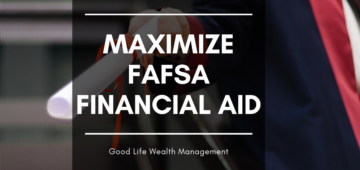One of the most frequent questions I hear from younger investors is whether they should hold off on investing until they pay off their student loans. College tuition has been growing at a rate much higher than inflation for several decades, and for many students, these costs are financed. It’s not uncommon for a student to graduate with six-figures in debt today.
For many, they view their college loans as the monkey on their back and want nothing more that to get rid of this debt as soon as possible. This intense dislike of debt is probably a good thing, especially if it encourages frugal decision making and a focus on financial responsibility. With retirement being 40 years away, investing doesn’t seem to offer the same immediate benefit as plowing as much cash as possible into eliminating student loans.
The problem with waiting to invest is that you miss out on the benefits of compounding. Let’s say Eager Eddie saves $5,000 a year starting at age 30. Earning 8%, Eddie will have $861,584 in his retirement account at age 65. Waiting Walter delays until age 40 to get started, but then invests double of what Eddie saved, $10,000 a year. Believe it or not, at age 65, Walter will still have less than Eddie, only $731,059. Waiting those ten years cost Walter $130,000, even though he contributed twice as much per year once he got started. When it comes to retirement saving, there truly is no making up for lost time.
By contributing to your retirement plan at work, you may be eligible for a company match. But even if there is not a company match, being able to make a tax deductible contribution will provide an immediate benefit of 25%, 28% or more, depending on your tax bracket.
Some will point out that with interest rates of 6% or higher, that there is no guarantee that their investment return will exceed the rate they would save on paying down their loan. Wouldn’t it be better to take the “sure thing” of saving 6% rather than the venturing into the unknowns of the investment world? The problem with this line of thinking is that your debt will decrease each year, so a 6% interest rate will cost fewer and fewer dollars each year. However, as your investment portfolio grows through contributions and compounding, a 6% return will equate to larger dollar growth rates. In other words, a 6% return on a $500,000 portfolio is ten times more than a 6% cost on a $50,000 loan.
My advice is don’t wait to get started investing. It’s not a choice of either-or; you have to find a way to do both investing and paying off your student loans.
A couple of additional considerations:
- If you ever needed money, you could access your investments (with possible penalties and taxes for retirement accounts), but if you put extra towards your loans, you cannot access that money later.
- You may be able to deduct student loan interest paid, up to $2,500 per year. This is subject to a phaseout if your income exceeds $65,000 (single) or $130,000 (married). See IRS Publication 970 for details.
- If you have Federal loans, make sure you read my article on Four Student Loan Forgiveness Programs, which also explains Income Based Repayment plans.





